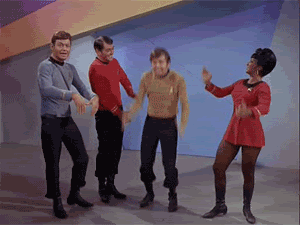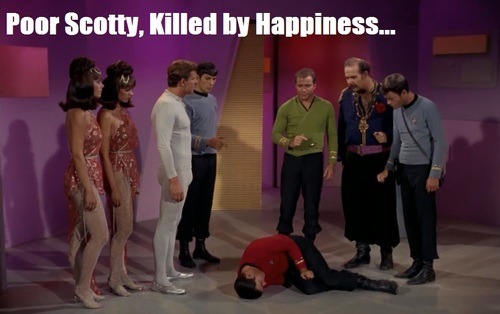Look at it this way: Suppose you went home to your wife and although she looked the same, she said things and and acted in ways that were contrary to what you valued about her as a person. Would you be able to ignore that and just be happy that she was still fun to be with?
Lots of people wouldn't, hence America's depressingly high divorce rate.
I guess I should have been clearer: I'm not talking about relatively minor changes here. Solely for the sake of making a point, I mean a complete reversal in every important way, particularly moral values and the like.
I.e. If a movie contradicts something I see as important to the character of ST, how can I be entertained by the result?
By trying to remember how Star Trek looked the FIRST time you saw it, not how it looked the four hundred and thirtieth time after years and years of growing up and maturing with it.
Fortunately that isn't possible.

IOW, by watching Star Trek like the kid you used to be, instead of the nitpicky, over-analyzing pseudo-expert that most of us are slowly mutating into in our old age. Stop thinking about it, stop analyzing it, stop looking for problems with it, just go with it.
My objections to ST09 are the exact opposite of nitpicking or over-analyzing. I'm not talking about the colour of the nacelles or the size of the ship. I am talking about a core aspect of TOS's ethos. Why would anyone have a major problem with minor issues?
Yes, because "social bias" is the main reason people thought Star Trek was childish....
Yep. It HAS to be social bias.
Well, you've convinced me. By the way, circumstantial evidence suggests that scene is from a Mudd episode. If so, no wonder I barely remember it.

Look at it this way: Suppose you went home to your wife and although she looked the same, she said things and and acted in ways that were contrary to what you valued about her as a person. Would you be able to ignore that and just be happy that she was still fun to be with? I.e. If a movie contradicts something I see as important to the character of ST, how can I be entertained by the result?
I think that if you're comparing Star Trek to a spouse, you may be taking it a bit too seriously.
I knew you would say that

But, we're all constantly changing, there isn't one of us that is the same exact person we were twenty-years ago.
As mentioned above that sort of change is not the situation I was suggesting. I just assumed SF fans would grasp the magnitude and immediacy of change I had in mind.

Anyway lets not go overboard here and assume I regard ST as some sort of religion. I have not, for example, launched a Jihad against anyone (recently).

On the other hand, the convenient cliché that TOS is just a TV show (as
Dennis suggests), is of course not actually true, any more than the Bible is just a book. I'm not going to get bent out of shape if anyone thinks it is, but I will protest any contention that everyone should. There are themes in TOS that are legitimately important and worthwhile. No-one should be embarrassed about acknowledging that. Or made to feel embarrassed, for that matter.
Star Trek, to me, is an escape from reality not a substitute. I watch it because I don't want to be reminded of the shitty world that is just outside my door. ...
Well my point is that there is probably more than one reason it doesn't remind you of that world.
The issue here though is at there ARE people who would compare their devotion and emotional attachment with Star Trek to that of a spouse. ...
Perhaps, but that's an issue I am not addressing. I was just pointing out that it not always possible to separate the fun side of something (Anything actually. A spouse was just an example. Don't read too much into it.) from its more serious considerations. Particularly not where they are in conflict.
What people fail to recognize who are in this position is that their personal desires and preferences cannot be met any longer. The expectations are too high. Times have changed, and with it the people in the next generations (no pun) and their values and what appeals to them. You can't continue to make Star Trek the way it was made 40 or even 20 years ago. It simply can't be done. Not and have any kind of viability for the future anyway.
Interesting. It would seem that JJ and the writers disagree with you because while STiD may not really be my favorite Trek, it didn't have the problem the first one did. In fact in some ways it did go back to the kind of values TOS was known for and with no bad side effects you seem to be worried about.
Cuz it ain't gunna happen!
It already did.

That why I laugh when some fans try to claim (about TOS) -- "Star Trek was NEVER about action/adventure; and was ALWAYS 'socially relevant...'; as that ISN'T true. There's plenty of episodes where 'action/adventure' is the drux of the story <-- And nothing wrong with that (IMO).
Can you perhaps link to someone making that claim about TOS? Because it seems more like folklore than anything someone actually wrote to me.
Just look at any post cancellation interview by Gene Roddenberry; or any of the documentaries that include interviews of fans; and all you see/hear is how "socially relevant" or "always tackling social issues" is said.
Already that's starting to sound as though such people are not saying "Star Trek was NEVER about action/adventure". My guess is it is equally possible they wouldn't claim all episodes were overflowing with social relevance either, but without any links ... .
Well, in my experience, there seem to have been far more frequent attempts to down play or even ignore the ethical side of TOS than there have been attempts to over emphasis it. On the other hand I can't recall ever having seen anyone claim it has no action adventure elements. That would indeed be laughable.

Oh come on - whenever there's any talk of 'Star Trek' in the media, they always bring up how 'socially relevant' ; and usually talk about 'the first inter-racial kiss' (from "Plato's Stepchildren") although they always take the kiss out of context in that it really wasn't a plot point for the actual story being told; and in context, Kirk and Uhura are FORCED to kiss by the Platonians.
I was thinking of forums like this one but its nice to hear the balance is redressed a little in the general media.
That why I feel 'Star Trek' (2009) and 'Star Trek Into Darkness' are a good, fun, and entertaining update/modernization of old school TOS because both films DID do a good job of incorporating everything that made the original TOS enjoyable for me over the years.
Since I get the feeling you are more of the action adventure persuasion, I can understand why you feel like that. But since I also value the message of hope for the future (etc) implicit in much of TOS, I would regard ST09 as "anti-Trek" (despite the healing hands of time

). STiD however is, relatively speaking, a massive improvement in that department, in my view
What? Just because I mention that Star Trek was as much 'action/adventure' as it was 'social commentary' I'm watching it just for the 'action/adventure'? Wow.
If you had actually said that in the post I replied to (my apologies if you said it elsewhere), I would have agreed with you. but you wrote: "... both films DID do a good job of incorporating everything that made the original TOS enjoyable for me over the years."
Lets just say I don't share that opinion, at least concerning the first one.
Seriously? This is ridiculous.
There is no meaningful point of comparison between the two situations. The analogy is incompetent and foolish.
These are goddamn movies and tv shows we're talking about.
I'm not really getting as sense of what you're trying to say here.



 ). And that, more than anything, is the reason TOS resonated more with children and young adults than it did with older viewers.
). And that, more than anything, is the reason TOS resonated more with children and young adults than it did with older viewers.





 ). STiD however is, relatively speaking, a massive improvement in that department, in my view
). STiD however is, relatively speaking, a massive improvement in that department, in my view
